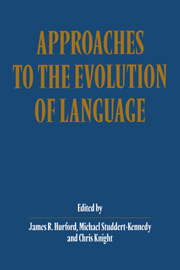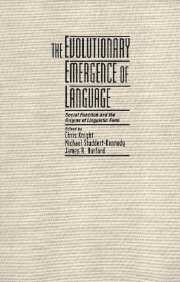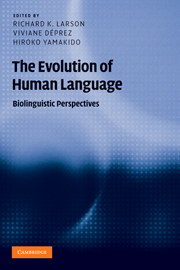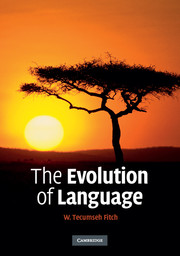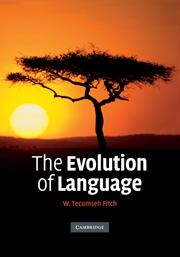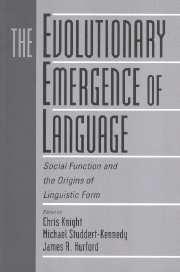Approaches to the Evolution of Language
This is one of the first systematic attempts to bring language within the neo-Darwinian framework of modern evolutionary theory, without abandoning the vast gains in phonology and syntax achieved by formal linguistics over the past forty years. The contributors, linguists, psychologists, and paleoanthropologists, address such questions as: what is language as a category of behavior; is it an instrument of thought or of communication; what do individuals know when they know a language; what cognitive, perceptual, and motor capacities must they have to speak, hear, and understand a language? For the past two centuries, scientists have tended to see language function as largely concerned with the exchange of practical information. By contrast, this volume takes as its starting point the view of human intelligence as social, and of language as a device for forming alliances, in exploring the origins of the sound patterns and formal structures that characterize language.
- This is the first book of its kind, giving an integrated, neo-Darwinian view of the social and cognitive bases of language evolution
- The contributors are mainly linguists and psychologists directly concerned with language and its evolution
- The emphasis is on empirical rigor rather than lofty speculation
Product details
September 1998Paperback
9780521639644
456 pages
229 × 153 × 31 mm
0.719kg
10 tables
Available
Table of Contents
- Introduction Michael Studdert-Kennedy, Chris Knight, and James R. Hurford
- Part I. Grounding Language Function in Social Cognition:
- 1. Introduction: Grounding language function in social cognition Chris Knight
- 2. On discontinuing the continuity-discontinuity debate Jean Aitchison
- 3. The origin of language and cognition Ib Ulbaek
- 4. Mimesis and the executive suite: missing links in language evolution Merlin Donald
- 5. Ritual/speech co-evolution: a 'selfish gene' solution to the problem of deception Chris Knight
- 6. Theory of mind and the evolution of language Robin Dunbar
- 7. Old wives' tales: the gossip hypothesis and the reliability of cheap signals Camilla Power
- 8. Altruism, status, and the origin of relevance Jean-Louis Dessalles
- 9. The evolution of language from social intelligence Robert Worden
- Part II. The Emergence of Phonology:
- 10. Introduction: the emergence of phonology Michael Studdert-Kennedy
- 11. Long call structure in apes as a possible precursor for language Mária Ujhelyi
- 12. Social sound-making as a precursor to spoken language John F. Locke
- 13. The particulate origins of language generativity: from syllable to gesture Michael Studdert-Kennedy
- 14. Evolution of the mechanisms of language output: comparative neurobiology of vocal and manual communication Peter MacNeilage
- 15. Systemic constraints and adaptive change in the formation of sound structure Björn Lindblom
- 16. The development of sound systems in human language Klaus J. Kohler
- 17. Synonymy avoidance, phonology and the origin of syntax Andrew Carstairs-McCarthy
- Part III. The Emergence of Syntax:
- 18. Introduction: the emergence of syntax James R. Hurford
- 19. On the supposed 'counterfunctionality' of universal grammar: some evolutionary implications Frederick J. Newmeyer
- 20. Language evolution and the minimalist program: the origins of syntax Robert C. Berwick
- 21. Catastrophic evolution: the case for a single step from protolanguage to full human language Derek Bickerton
- 22. Fitness and the selective adaptation of language Simon Kirby
- 23. Synthesizing the origins of language and meaning using co-evolution, self-organization and level formation Luc Steels
- 24. Computational simulations of the emergence of grammar John Batali.

